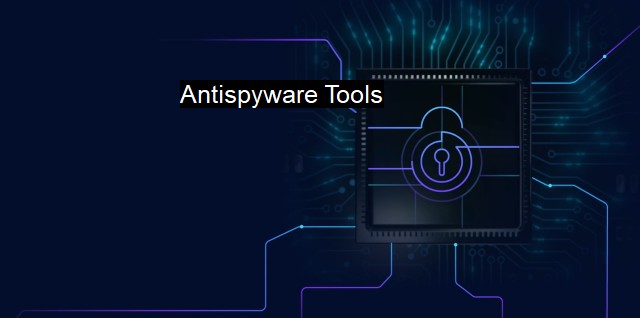What are Antispyware Tools?
Antispyware Tools: The Powerhouse of Cybersecurity and Malware Defense for Protection Against Stealthy Spyware Threats
Anti-spyware tools form a significant part of our defenses especially in contrast to the escalating numbers and sophistication of cyber threats in today's digitized landscape.An anti-spyware tool operates as a type of software, designed specifically to detect, prevent, and eliminate spyware. Spywares are malicious code designed to gather data secretly about an individual or organization without their consent. They can access and relay sensitive information such as financial data, passwords and activity logs to unauthorized individuals or organizations, making them a significant threat to data privacy and security.
The purpose of an anti-spyware tool is twofold: to protect the user from potential threats by proactively preventing the installation of spywares, but also to scan, detect, and eliminate any spyware which may have already infected the system. Effective anti-spyware tools frequently bridge antivirus functionalities to provide comprehensive protection against a variety of malware.
Like numerous software solutions, modern anti-spyware tools prioritize user-friendly design. After installation, it can run seamlessly in the background, delivering constant safeguarding to the user's system without interrupting or decelerating core activities. These tools can carry out regular full system scans, keeping a watchful eye on the overall health and integrity of a system. They tirelessly explore every file and folder, hunting for potential miscreants.
While their user-friendly nature is agreeable, the real prowess of an effective anti-spyware tool lies with its ability to identify a myriad of spyware threats; this typically refers to their spyware definition database. A routinely updated database offers a catalog of recognized spywares, known vulnerabilities, and potential infection methods. It allows the anti-spyware tool to conduct more thorough and informed scans, thereby enhancing its capacity to reveal otherwise indiscernible threats.
Most anti-spyware tools incorporate the systematic quarantine of detected threats, either enabling its eradication or giving the user the choice and time to research the potential threat before doing so. It serves to avert the spread and impact of an embedded spyware before it inflicts irreparable harm to data and systems.
Just as hackers and malicious entities advance their knowledge and techniques, anti-spyware tools aren't in a static state. They evolve rapidly, adapting to new spyware variants, besides widespread, terrifying strains that tend to spark worldwide anxieties. Frequent updates are an asset, allowing continuous improvement of their overall efficacy.
While these tools provide robust security against most spyware threats, their effectiveness is contingent on their usage scenario. Also, today's threats are not confined merely to spywares. Some malicious entities use a confluence of hacking techniques, blending different threats to masks its footing. As a result, the value of comprehensive cybersecurity suites, intertwining antivirus and antispyware capabilities, is high.
Complementing antispyware tools with sound cybersecurity practices holds paramount importance. Regular system updates, secure password practices, reliance on secure connections, privacy settings, and user education amplify the effectiveness of any tool.
Anti-spyware tools form an essential armored shield, diligently safeguarding against spies snooping around in personal or business data. As cyber threats got advanced and diversified, these tools alone cannot offer comprehensive protection. Also, they are an important piece fitting into mature, well-designed cybersecurity strategies intertwining software and practical, precautionary strategies. The final line of defense remains to vary vigilant users with good cybersecurity habits.

Antispyware Tools FAQs
What is an antispyware tool and how does it work?
An antispyware tool is a type of software designed to detect and remove spyware from a computer system. Spyware is a type of malware that can infect a computer without the user's knowledge and gather sensitive information. An antispyware tool works by scanning the system for any suspicious programs or files that may be spyware and removing them.Do I need an antispyware tool if I already have antivirus software installed on my computer?
While antivirus software can detect and remove some spyware, it may not be able to detect all types of spyware. Antispyware tools are specifically designed to detect and remove spyware, and can provide an added layer of protection for your computer. It is recommended to have both antivirus and antispyware tools installed on your machine.Are there any free antispyware tools available?
Yes, there are many free antispyware tools available. Some popular ones include Malwarebytes Anti-Malware, Spybot Search & Destroy, and Ad-Aware Free Antivirus+. While free tools may not offer as many features as paid ones, they can still provide basic protection against spyware.How often should I run an antispyware scan?
It is recommended to run an antispyware scan at least once a week to ensure that your system is not infected with spyware. However, if you notice any unusual behavior on your computer or suspect that you may have been infected with spyware, it is a good idea to run a scan immediately.| | A | | | B | | | C | | | D | | | E | | | F | | | G | | | H | | | I | | | J | | | K | | | L | | | M | |
| | N | | | O | | | P | | | Q | | | R | | | S | | | T | | | U | | | V | | | W | | | X | | | Y | | | Z | |
| | 1 | | | 2 | | | 3 | | | 4 | | | 7 | | | 8 | | |||||||